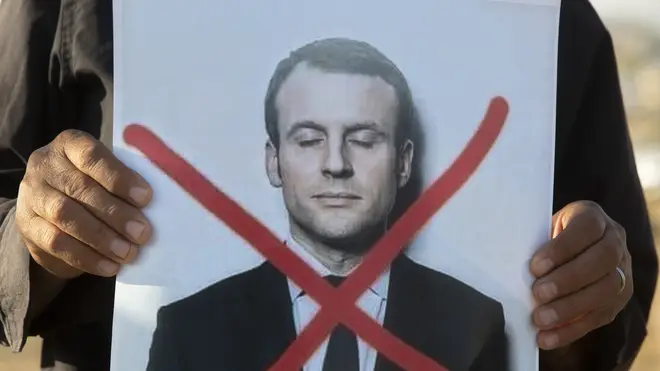
Tonight with Andrew Marr 6pm - 7pm
26 October 2020, 16:24

Protests have been held in Turkey and the Gaza Strip and are being planned in Pakistan.
Muslims in the Middle East and beyond broadened their calls for boycotts of French products and protests as a clash over depictions of the Prophet Mohammed and the limits of free speech intensified.
Kuwaiti stores pulled French yogurts and bottles of sparkling water from their shelves, Qatar University cancelled a French culture week, and calls to stay away from the Carrefour grocery store chain were trending on social media in Saudi Arabia and the United Arab Emirates.
Protests have been held in Turkey and the Gaza Strip and are being planned in Pakistan.
The beheading earlier this month of French teacher Samuel Paty, who had shown caricatures of the prophet in his class, has once again ignited a debate over such depictions, which Muslims consider blasphemous.
The teacher, who was killed by an 18-year-old Chechen refugee, has been heralded at home as a national symbol of France’s dearly-held secular ideals and its rejection of religious intrusion in public spheres.

French President Emmanuel Macron has vigorously defended such depictions as protected under the right to free speech and at a memorial for the teacher last week, he said: “We won’t renounce the caricatures.”
And in tweets published in both Arabic and English on Sunday, Mr Macron wrote: “We will not give in, ever”, while adding that France does not accept hate speech and respects all differences.
His government plans a bill aimed at rooting out what Mr Macron calls “Islamist separatism”, which he contends has created a parallel culture in France, one that rejects French laws and norms.
While he blamed some of this separatism on France’s colonial past in north Africa, he was quoted as saying Islam is “a religion that is in crisis all over the world” and that Muslim positions are “hardening”.
Mr Macron’s stance has drawn anger on social media and from some political leaders in the Muslim world.
Egypt’s top cleric, Sheikh Ahmed el-Tayeb, who is also the Grand Imam of Al-Azhar, Sunni Islam’s highest seat of learning, condemned what he said was a systematic campaign aimed at dragging Islam into political conflicts and discord.
Pakistan Prime Minister Imran Khan said the French leader chose to encourage anti-Muslim sentiment and deliberately provoke Muslims by encouraging the display of blasphemous cartoons targeting Islam, while Pakistan also summoned the French ambassador to lodge a protest over Mr Macron’s condoning of the caricatures.
A small rally was held on Monday in the Gaza Strip outside the French cultural centre with people carrying banners showing photos of Mr Maron with an “X” over his face.
They held banners that read: “Despite Macron’s malice, we prevail for our Prophet.”
In Pakistan, the leader of a radical Islamic party called on people to hold a rally against France on Friday in the eastern city of Lahore to mark the Prophet Mohammed’s birthday, which is traditionally a time of celebration.
Meanwhile, groups ranging from the Taliban in Afghanistan to Hezbollah in Lebanon have condemned Mr Macron’s defence of caricatures depicting the Prophet Mohammed.